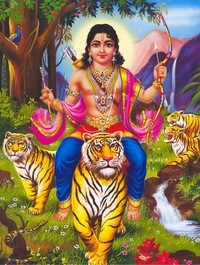
Manikanta
Actor
Ayyappan is the Hindu God, particularly popular in Kerala. Although devotion to Ayyappan has been prevalent in Kerala for a long time, in the rest of South India, it has become popular only in recent times (in the late 20th century). According to Hindu theology, he is the son of Harihara (Mahavishnu in the form of Mohini and Shiva). Ayyappan is also referred to as Ayyappa, Sastavu, Hariharasudhan, Manikantan, Shasta or Dharma Shasta. The iconography of Ayyappan depicts him as a handsome celibate God doing yoga and as an epitome of Dharma, who wears a bell around his neck. In the Hindu pantheon, his legends are relatively recent but diverse. For some, he is also an incarnation of the Buddha. He is honored by Muslims in Kerala, with legends wherein Ayyappan defeats and gains worship of the Muslim brigand Vavar. In the Hindu tradition popular in the Western Ghats of India, he was born with the powers of Shiva and Vishnu to confront and defeat the shape shifting evil Buffalo demoness Mahishi. He was raised by a childless royal couple Rajashekara pandiyan and Koperundevi, and grows up as a warrior yogi champion of ethical and dharmic living. In the South Indian version, Ayyappan images show him as riding a tigress, but in some places such as Sri Lanka he is shown as riding a white elephant. Ayyappan popularity has grown in many parts of India, and the most prominent Ayyappan shrine is at Sabarimala, nestled in the hills of Pathanamthitta of Kerala. The shrine receives millions of pilgrims every year in late December and early January, many of whom prepare for weeks before and then climb the hill barefoot, making it one of the largest active pilgrimage sites in the world. The pilgrimage attracts a wide range of devotees, from diverse social or economic backgrounds, except women in their fertile age because Ayyappan is believed to be the celibate deity. Ayyappan may share a historical relationship with the Tamil deity Aiyanar. The most significant festival linked to him is the Makaravilakku (Makara Sankranti), observed around the winter solstice.
Ayyappan is the Hindu God, particularly popular in Kerala. Although devotion to Ayyappan has been prevalent in Kerala for a long time, in the rest of South India, it has become popular only in recent times (in the late 20th century). According to Hindu theology, he is the son of Harihara (Mahavishnu in the form of Mohini and Shiva). Ayyappan is also referred to as Ayyappa, Sastavu, Hariharasudhan, Manikantan, Shasta or Dharma Shasta.
The iconography of Ayyappan depicts him as a handsome celibate God doing yoga and as an epitome of Dharma, who wears a bell around his neck. In the Hindu pantheon, his legends are relatively recent but diverse. For some, he is also an incarnation of the Buddha. He is honored by Muslims in Kerala, with legends wherein Ayyappan defeats and gains worship of the Muslim brigand Vavar. In the Hindu tradition popular in the Western Ghats of India, he was born with the powers of Shiva and Vishnu to confront and defeat the shape shifting evil Buffalo demoness Mahishi. He was raised by a childless royal couple Rajashekara pandiyan and Koperundevi, and grows up as a warrior yogi champion of ethical and dharmic living. In the South Indian version, Ayyappan images show him as riding a tigress, but in some places such as Sri Lanka he is shown as riding a white elephant.
Ayyappan popularity has grown in many parts of India, and the most prominent Ayyappan shrine is at Sabarimala, nestled in the hills of Pathanamthitta of Kerala. The shrine receives millions of pilgrims every year in late December and early January, many of whom prepare for weeks before and then climb the hill barefoot, making it one of the largest active pilgrimage sites in the world. The pilgrimage attracts a wide range of devotees, from diverse social or economic backgrounds, except women in their fertile age because Ayyappan is believed to be the celibate deity. Ayyappan may share a historical relationship with the Tamil deity Aiyanar. The most significant festival linked to him is the Makaravilakku (Makara Sankranti), observed around the winter solstice.
Manikanta Movies & TV Shows - Watch Online
